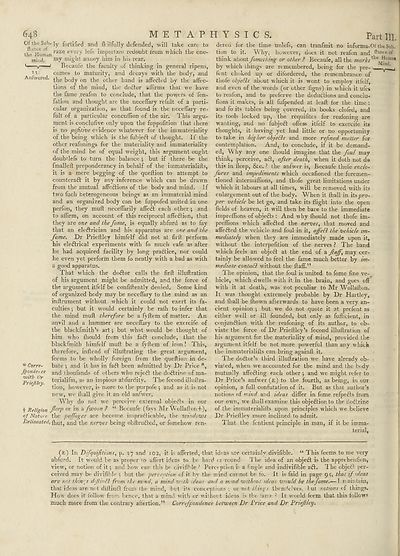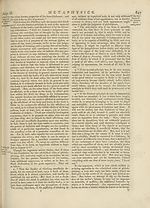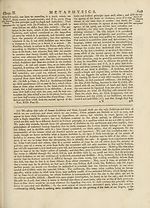Encyclopaedia Britannica, or, a Dictionary of arts, sciences, and miscellaneous literature : enlarged and improved. Illustrated with nearly six hundred engravings > Volume 13, MAT-MIC
(694) Page 648
Download files
Complete book:
Individual page:
Thumbnail gallery: Grid view | List view

648 M E T A P H Y S I C S. Part III
Ctf the Sub-]y fortified and flcilfully defended, will take care to
the1 Human raze eveiy important redoubt from which the ene-
mind. n)y might annoy iiim in his rear.
' - ■' ■ v~~~J Becauie the faculty of thinking in general ripens,
2v comes to maturity, and decays with the body, and
Anfwered. on |_]ie 0t]lt.r hand is affedled by the affec¬
tions of the mind, the dodfor affirms that we have
the fame reafon to conclude, that the powders of fen-
fation and thought are the neceffary refult of a parti¬
cular organization, as that found is the neceffary re¬
fult of a particular concuffion of the air. This argu¬
ment is conclufive only upon the fuppofition that there
is no pojitive evidence whatever for the immateriality
of the being which is the fubjeft of thought. If the
other reafonings for the materiality and immateriality
of the mind be of equal weight, this argument ought
doubfiefs to turn the balance ; but if there be the
fmalleft preponderancy in behalf of the immaterialills,
it is a mere begging of the queftion to attempt to
counteradl it by any inference which can be drawn
from the mutual affeftions of the body and mind. If
two fuch heterogeneous beings as an immaterial mind
and an organized body can be fuppofed united in one
perfon, they muff neceffarily affedt each other •, and
to affirm, on account of this reciprocal affection, that
they are one and the fame, is equally abfurd as to fay
that an eleftrician and his apparatus are one and the
fame. Dr Prielfley himfelf did not at firft perform
his eleflrical experiments with fo much cafe as after
he had acquired facility by long practice, nor could
he even yet perform them fo neatly with a bad as with
a good apparatus.
That wdiich the doctor calls the firft illuftration
of his argument might be admitted, and the force of
the argument itfelf be confiffentlv denied. Some kind
of organized body may be neceffary to the mind as an
inftrument without which it could not exert its fa¬
culties •, but it wrould certainly be rath to infer that
the mind muff therefore be a fyftem of matter. An
anvil and a hammer are neceffary to the exercife of
the blackfmith’s art *, but what would be thought of
him who fhould from this fa6I conclude, that the
blackfmith himfelf muff be a fyftem of iron ! This,
therefore, inftead of illuftrating the great argument,
feems to be wholly foreign from the queftion. in de-
^ Corre- bate \ and it has in faff been admitted by Dr Price *,
/ponderce anc| (houfands of others who reject the doftrioe of ma-
'priejtlf terialifm, as an impious abfurdity. The fecond illuftra¬
tion, however, is more to the purpofe ; and as it is not
new, we ftiall give it. an old anfwer.
Why do not we perceive external objects in our
f Religion flceP or ’n a fwoon ? “ Bt caufe (fays Mr Wollafton-f),
of Nature the paffages are become irnpracticable, the windows
Delineated, ftlut} and the nerves being obftrudled, or fomehow ren¬
dered for the time unlefs, can tranfmit no informa-Of the Sub.
tion to it. Why, however, does it not reafon and fiance of
think aboutfomething or other? Becaufe, all the markstheM^'c|nai1
by which things are remembered, being for the pre- —_ ^
fent choked up or diibrdered, the remembrance of
thofe objeEis about which it is wont to employ itfelf,
and even of the words (or other figns) in which it ufes
to reafon, and to prelerve the dedu&ions and conciu-
fions it makes, is all fufpended at leaft for the time :
and fo its tables being covered, its books clofed, and
its tools locked up, the requilites for realoning are
wanting, and no fubjeft offers itfelf to exercife its
thoughts, it having yet had little or no opportunity
to take in higher objetis and more refined matter for
contemplation. And, to conclude, if it be demand¬
ed, Why any one fhould imagine that the foul may
think, perceive, a£t, after death, wrhen it doth not do
this in ileep, &c. ? the anfwer is, Becaufe thofe enc/o-
fures and impediments which occafioned the foremen-
tioned intermiffions, and thofe great limitations under
which it labours at all times, will be removed with its
enlargement out of the body. When it fhall in its pro¬
per vehicle be let go, and take its flight into the open
fields of heaven, it wrill then be bare to the immediate
impreffions of objects: And why fhould not thofe im-
preffions which affe&ed the nerves, that moved and
affe&ed the vehicle and foul in it, ajfeB the vehicle im¬
mediately when they are immediately made upon it,
without the interpofition of the nerves ? The hand
which feels an objeft at the end of a faff, may cer¬
tainly be allowed to feel the fame much better by im-
mediate contaB without the ftaff.”
The opinion, that the foul is united to fome fine ve¬
hicle, which dwells with it in the brain, and goes off
with it at death, was not peculiar to Mr Wollafton.
It was thought extremely probable by Dr Hartley,
and fhall be fhown afterwards to have been a very an¬
cient opinion ; but we do not quote it at prefent as
either v’ell or ill founded, but only as fufticient, in
conjunction with the reafoning of its author, to ob¬
viate the force of Dr Prieftley’s fecond illuftration of
his argument for the materiality of mind, provided the
argument itfelf be not more powerful than any which
the immaterialifts can bring againfl it.
The doctor’s third illuftration we have already ob¬
viated, when avc accounted for the mind and the body
mutually affeCting each other ; and we might refer to
Dr Price’s anfwer (e) to the fourth, as being, in our
opinion, a full confutation of it. But as that author’s
notions of mind and ideas differ in fome refpeCts from
our own, we flrall examine this objeCfionto the doCtrine
of the immaterialifts upon principles which we believe
Dr Prieftley more inclined to admit.
That the fentient principle in man, if it be imma¬
terial.
(e) In T) if quifftions, p. 3 7 and 102, it is afferted, that ideas are certainlv divifible. “ 1 his feems to me very
abfurd. It would be as proper to affert ideas to bt hard or round The idea of an objeCt is the apprehenfion,
view, or notion of it; and how can this b' civifihle ? Perception i- a fingle and indivifible aCt. 'J he objeCl per¬
ceived may be divifible *, but the perception of it by the mind cannot be lo. It is faid in page 9^, that if Ideas
are not things dfftvB from the mind, a mind w th ideas and a nund without ideas would be thefame.— I maintain,
that ideas are net diftitiCI from the mind, but its conceptions: or not ihings tbrndt’ves. but notions of things.
How does it follow' from hence, that a mind with or without ideas b the >anw > It would feem that this follows
much more from the contrary allertion.” Corrffpondence between Dr Price and Dr Prieffley.
Ctf the Sub-]y fortified and flcilfully defended, will take care to
the1 Human raze eveiy important redoubt from which the ene-
mind. n)y might annoy iiim in his rear.
' - ■' ■ v~~~J Becauie the faculty of thinking in general ripens,
2v comes to maturity, and decays with the body, and
Anfwered. on |_]ie 0t]lt.r hand is affedled by the affec¬
tions of the mind, the dodfor affirms that we have
the fame reafon to conclude, that the powders of fen-
fation and thought are the neceffary refult of a parti¬
cular organization, as that found is the neceffary re¬
fult of a particular concuffion of the air. This argu¬
ment is conclufive only upon the fuppofition that there
is no pojitive evidence whatever for the immateriality
of the being which is the fubjeft of thought. If the
other reafonings for the materiality and immateriality
of the mind be of equal weight, this argument ought
doubfiefs to turn the balance ; but if there be the
fmalleft preponderancy in behalf of the immaterialills,
it is a mere begging of the queftion to attempt to
counteradl it by any inference which can be drawn
from the mutual affeftions of the body and mind. If
two fuch heterogeneous beings as an immaterial mind
and an organized body can be fuppofed united in one
perfon, they muff neceffarily affedt each other •, and
to affirm, on account of this reciprocal affection, that
they are one and the fame, is equally abfurd as to fay
that an eleftrician and his apparatus are one and the
fame. Dr Prielfley himfelf did not at firft perform
his eleflrical experiments with fo much cafe as after
he had acquired facility by long practice, nor could
he even yet perform them fo neatly with a bad as with
a good apparatus.
That wdiich the doctor calls the firft illuftration
of his argument might be admitted, and the force of
the argument itfelf be confiffentlv denied. Some kind
of organized body may be neceffary to the mind as an
inftrument without which it could not exert its fa¬
culties •, but it wrould certainly be rath to infer that
the mind muff therefore be a fyftem of matter. An
anvil and a hammer are neceffary to the exercife of
the blackfmith’s art *, but what would be thought of
him who fhould from this fa6I conclude, that the
blackfmith himfelf muff be a fyftem of iron ! This,
therefore, inftead of illuftrating the great argument,
feems to be wholly foreign from the queftion. in de-
^ Corre- bate \ and it has in faff been admitted by Dr Price *,
/ponderce anc| (houfands of others who reject the doftrioe of ma-
'priejtlf terialifm, as an impious abfurdity. The fecond illuftra¬
tion, however, is more to the purpofe ; and as it is not
new, we ftiall give it. an old anfwer.
Why do not we perceive external objects in our
f Religion flceP or ’n a fwoon ? “ Bt caufe (fays Mr Wollafton-f),
of Nature the paffages are become irnpracticable, the windows
Delineated, ftlut} and the nerves being obftrudled, or fomehow ren¬
dered for the time unlefs, can tranfmit no informa-Of the Sub.
tion to it. Why, however, does it not reafon and fiance of
think aboutfomething or other? Becaufe, all the markstheM^'c|nai1
by which things are remembered, being for the pre- —_ ^
fent choked up or diibrdered, the remembrance of
thofe objeEis about which it is wont to employ itfelf,
and even of the words (or other figns) in which it ufes
to reafon, and to prelerve the dedu&ions and conciu-
fions it makes, is all fufpended at leaft for the time :
and fo its tables being covered, its books clofed, and
its tools locked up, the requilites for realoning are
wanting, and no fubjeft offers itfelf to exercife its
thoughts, it having yet had little or no opportunity
to take in higher objetis and more refined matter for
contemplation. And, to conclude, if it be demand¬
ed, Why any one fhould imagine that the foul may
think, perceive, a£t, after death, wrhen it doth not do
this in ileep, &c. ? the anfwer is, Becaufe thofe enc/o-
fures and impediments which occafioned the foremen-
tioned intermiffions, and thofe great limitations under
which it labours at all times, will be removed with its
enlargement out of the body. When it fhall in its pro¬
per vehicle be let go, and take its flight into the open
fields of heaven, it wrill then be bare to the immediate
impreffions of objects: And why fhould not thofe im-
preffions which affe&ed the nerves, that moved and
affe&ed the vehicle and foul in it, ajfeB the vehicle im¬
mediately when they are immediately made upon it,
without the interpofition of the nerves ? The hand
which feels an objeft at the end of a faff, may cer¬
tainly be allowed to feel the fame much better by im-
mediate contaB without the ftaff.”
The opinion, that the foul is united to fome fine ve¬
hicle, which dwells with it in the brain, and goes off
with it at death, was not peculiar to Mr Wollafton.
It was thought extremely probable by Dr Hartley,
and fhall be fhown afterwards to have been a very an¬
cient opinion ; but we do not quote it at prefent as
either v’ell or ill founded, but only as fufticient, in
conjunction with the reafoning of its author, to ob¬
viate the force of Dr Prieftley’s fecond illuftration of
his argument for the materiality of mind, provided the
argument itfelf be not more powerful than any which
the immaterialifts can bring againfl it.
The doctor’s third illuftration we have already ob¬
viated, when avc accounted for the mind and the body
mutually affeCting each other ; and we might refer to
Dr Price’s anfwer (e) to the fourth, as being, in our
opinion, a full confutation of it. But as that author’s
notions of mind and ideas differ in fome refpeCts from
our own, we flrall examine this objeCfionto the doCtrine
of the immaterialifts upon principles which we believe
Dr Prieftley more inclined to admit.
That the fentient principle in man, if it be imma¬
terial.
(e) In T) if quifftions, p. 3 7 and 102, it is afferted, that ideas are certainlv divifible. “ 1 his feems to me very
abfurd. It would be as proper to affert ideas to bt hard or round The idea of an objeCt is the apprehenfion,
view, or notion of it; and how can this b' civifihle ? Perception i- a fingle and indivifible aCt. 'J he objeCl per¬
ceived may be divifible *, but the perception of it by the mind cannot be lo. It is faid in page 9^, that if Ideas
are not things dfftvB from the mind, a mind w th ideas and a nund without ideas would be thefame.— I maintain,
that ideas are net diftitiCI from the mind, but its conceptions: or not ihings tbrndt’ves. but notions of things.
How does it follow' from hence, that a mind with or without ideas b the >anw > It would feem that this follows
much more from the contrary allertion.” Corrffpondence between Dr Price and Dr Prieffley.
Set display mode to:
![]() Universal Viewer |
Universal Viewer | ![]() Mirador |
Large image | Transcription
Mirador |
Large image | Transcription
Images and transcriptions on this page, including medium image downloads, may be used under the Creative Commons Attribution 4.0 International Licence unless otherwise stated. ![]()
| Permanent URL | https://digital.nls.uk/192693069 |
|---|
| Attribution and copyright: |
|
|---|
| Description | Ten editions of 'Encyclopaedia Britannica', issued from 1768-1903, in 231 volumes. Originally issued in 100 weekly parts (3 volumes) between 1768 and 1771 by publishers: Colin Macfarquhar and Andrew Bell (Edinburgh); editor: William Smellie: engraver: Andrew Bell. Expanded editions in the 19th century featured more volumes and contributions from leading experts in their fields. Managed and published in Edinburgh up to the 9th edition (25 volumes, from 1875-1889); the 10th edition (1902-1903) re-issued the 9th edition, with 11 supplementary volumes. |
|---|---|
| Additional NLS resources: |
|

